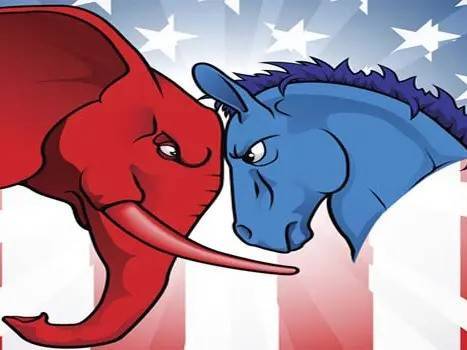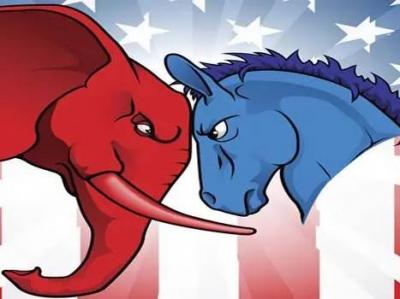In the midst of events related to the American elections, we often hear about the upcoming "Super Tuesday." What do we know about it? On March 5, tomorrow Tuesday, 15 American states will hold elections in what is known as the "Super Tuesday" primaries, including Alabama, Alaska, Arkansas, California, Colorado, Maine, Massachusetts, Minnesota, North Carolina, Oklahoma, Tennessee, Texas, Utah, Vermont, and Virginia. There will also be voting in the territory of American Samoa. Results from the Democratic caucuses in Iowa, conducted by mail-in ballots, are also expected to be announced. It is worth noting that "Super Tuesday" is the day of the American presidential primary that includes the largest number of participating states.
Most experts agree that "Super Tuesday," as we know it today, began in 1988, when a group of Democrats in Southern states decided to title their presidential primary process as such following Republican President Ronald Reagan's victory over the Democratic candidate for the White House four years prior.
#### Republican Party
"Super Tuesday" holds great significance because it represents the selection of more than one-third of the delegates that will be appointed for the Republican National Convention to be held in Milwaukee, Wisconsin. In the Republican contests, 874 delegates out of 2,429 are competing, including delegates from California and Texas, the two most populous states. A candidate needs at least 1,215 delegates to secure the nomination at the Republican National Convention. The distribution of Republican delegates on "Super Tuesday" across the various states is as follows: Alabama (50), Alaska (29), American Samoa (9), Arkansas (40), California (169), Colorado (37), Maine (20), Massachusetts (40), Minnesota (39), North Carolina (74), Oklahoma (43), Tennessee (58), Texas (161), Utah (40), Vermont (17), and Virginia (48). Additionally, Americans will vote to select seats in the Senate and House of Representatives and state legislatures, as well as to elect attorneys general, judges, and city council members. Results are expected to begin flowing in as soon as the polls close in the states and territory, typically starting by 7 PM local time for each state.
#### Democratic Party
On the other hand, nearly one-third of the Democratic delegates will be determined on March 5 from contests in 14 out of 15 states, alongside the territory of American Samoa. In Alaska, Democrats will cast their votes on April 6. It is noted that President Joe Biden’s nomination for the Democratic Party is considered a forgone conclusion as he faces no competitors; his supporters are expected to rally behind him at the Democratic National Convention in August in Chicago, Illinois. Biden needs 1,439 delegates out of a total of 3,979.
Former President Trump remains able to maintain a strong grip on the Republican Party and stimulate voter turnout for the primaries at a higher rate than Democrats supporting Biden. Before "Super Tuesday," Trump won delegate votes in Michigan, Missouri, and Idaho in the Republican primaries. These victories bolster Trump’s bid to secure the Republican nomination against his competitor, former UN ambassador Nikki Haley. Haley has scored a symbolic victory in the Republican presidential primaries in Washington, D.C., marking her first win in the Republican nomination process.
"Super Tuesday" may represent Haley's last opportunity to halt Trump’s momentum toward the Republican nomination for the presidency, amid significant doubts about her ability to do so. Trump has repeatedly attacked his competitor Haley, stating that she cannot defeat Biden or any other Democratic candidate, and has expressed his desire to achieve an unprecedented victory in "Super Tuesday." However, Trump’s most substantial criticisms and attacks have been directed at competitor Biden, accusing him during a rally in North Carolina of orchestrating a conspiracy to undermine the United States. Trump claims that Biden is the real threat to democracy and seeks to dismantle the American system and invalidate the will of American voters.
Trump leads Biden by a two-point margin, and he is ahead in swing states, including Arizona, Georgia, Michigan, Nevada, and Wisconsin, while Biden holds a narrow lead over Trump in Pennsylvania. A Harvard University poll indicates that Trump has a six-point national lead over Biden, stating that Trump unites Republicans more strongly than Biden unites Democrats.
Within the Democratic camp, concerns about President Biden’s age pose a deep threat to his re-election efforts, according to a poll conducted by The New York Times in collaboration with Siena College. The poll results indicate that a majority of the voters who supported him in the 2020 election say he is now too old to effectively lead the country. Sixty-one percent believe he is "too advanced in age" to be an effective president. Doubts about Biden’s age stretch across generations, genders, races, and education levels, underscoring the president's failure to alleviate concerns within his party and counter Republican attacks portraying him as senile. Seventy-three percent of all registered voters believe he is too old to be effective, with 45% expressing doubt in his ability to carry out the role.




